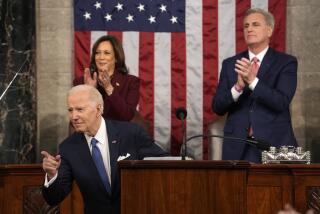Protectionism: ‘Savings’ Aren’t Worth the Price
- Share via
Woody Allen has created the consummate movie within a movie, “The Purple Rose of Cairo.” By the time you’ve belly laughed through it, you’re not sure who’s more real, the character who plays himself or the actor who plays the character. The one, at least, is not acting, while the other may be.
If that’s confusing, there’s some current theater on a real stage that’s equally so. It would also be amusing if the dialogue weren’t so sharp. One thing for sure, it’s sometimes unreal. It all has to do with the latest round of bombast in U.S.-Japan trade relations.
Consider this surprising scene: the prime minister of Japan, responding to Japan’s huge trade surplus with almost everybody, takes to the tube to plead with his people to buy American, or German or French, or anything that’s not Japanese. Forget the fact it’s like a father ordering the child to eat his vegetables--it certainly doesn’t make all that foreign stuff sound very enticing. What makes the appeal really peculiar is that it suggests the Japanese consumer is the ultimate bar to imports and now must sacrifice to make amends.
In some cases, no doubt, there is consumer resistance. But Japanese government, business and farm interests are primarily the ones that have prevented the average Japanese citizen from getting much of a taste for imported goods, especially products where tastes might develop rather quickly.
It’s not likely, for example, that there would be much Japanese resistance to beef or oranges just because they came with USA stamped on them--not if cheap American prices replaced inflated ones charged by domestic producers. The prime minister might have been more convincing if he’d mentioned that--and suggested that he was really appealing to Japanese protectionists to get their hands out of the pockets of the Japanese people.
The plea even contained a touch of irony worthy of Woody Allen, himself: a not-so-subtle warning that Japanese consumers should be on guard because the government would relax its testing of some imported goods.
Some of us are old enough to remember when U.S. businesses used that line to try to convince American consumers that cheap foreign goods weren’t really a bargain. It worked--for a while.
Japanese political leaders aren’t alone in their obfuscation, however. In the United States, some members of Congress have led the table-thumping about how Japanese goods are stealing our jobs. The statement is true as far as it goes. But it would be more honest to complain about how quotas imposed by this country also are stealing our jobs.
Almost no form of protection is of broad benefit to society. Auto quotas keep out foreign cars and keep some U.S. auto workers on the job. But the net effect is less competition in U.S. dealer showrooms and sharply higher prices. Which means the American consumer is digging deep to help out Detroit.
Some might be willing to do that. But they’d be less likely to if someone would explain that, without those quotas, they could purchase a car and still have $1,500 or so to go to the department store and buy something else, or to take a trip, or run up a tab in the local restaurant. An extra $1,500 on the price of a car means consumers help Detroit at the expense of other workers, maybe even a few in their own city--shopkeepers, airline mechanics or somebody making parts for home computers.
That all may sound as complex as Woody Allen’s script, but it is real.
Japanese consumers have been paying that price for a long time. They can avoid the high price of beef and citrus simply by eating something else they like less, but when Silicon Valley has better technology and their nation’s political pressure groups keep it out, they pay. Without knowing for sure where, they’re getting less for their money than they would otherwise.
Politicians find this fact easy to ignore because the pain isn’t as obvious as the closing of a General Motors plant or a Japanese farmer losing a piece of his market, developments that allow them to play on public sympathy.
Right now, such sympathy is running dangerously high in the United States. When pollsters ask, “Do you favor limiting imports?”, an increasing share of the populace answers, “Yes,” in the name of saving jobs. Maybe they should be asked, “Whose jobs?”
More to Read
Only good movies
Get the Indie Focus newsletter, Mark Olsen's weekly guide to the world of cinema.
You may occasionally receive promotional content from the Los Angeles Times.








